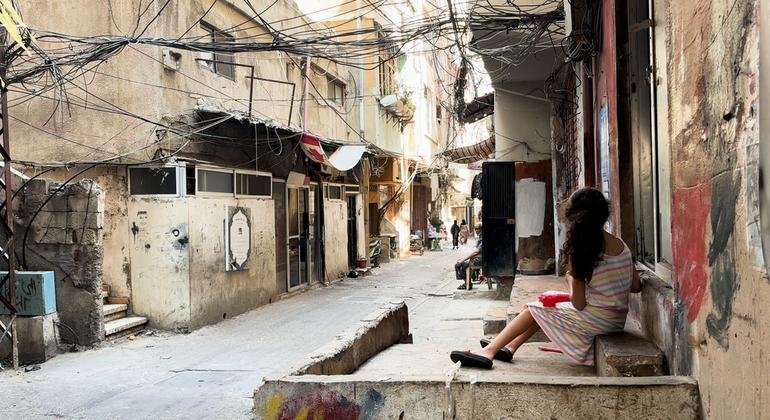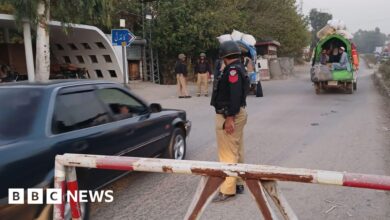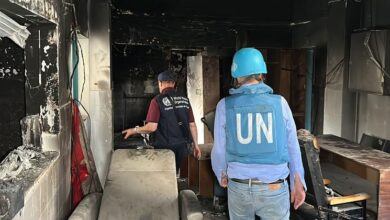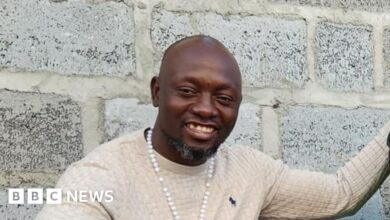Exclusive: An inside look at the lives of Palestinian refugees in Lebanon as they await a solution to their plight

The Al Biddawi camp for Palestinian refugees was established in 1955 to accommodate many of those displaced from the Upper Galilee and northern coastal cities during the period known as Palestine. Nakbaor disaster in Arabic.
Since then, the camp’s population has ballooned as violence continues to haunt its stateless population, from Lebanon’s civil war to the conflict in Syria, which has sent waves of Syrian and Palestinian refugees pouring across the border into the small Mediterranean country.
The narrow, squalid streets are a symbol of the struggle for survival here. In one square kilometer, more than 21,000 Palestinians live alongside many impoverished Lebanese citizens and Syrian refugees, according to the United Nations’ Palestine Relief Agency. UNRWA.

Graffiti along the main street of the Al Biddawi camp for Palestinian refugees in northern Lebanon.
Like many impoverished neighborhoods surrounding the refugee camp, jobs have become increasingly scarce here following the economic crisis that has engulfed Lebanon since late 2019, and even those who do have jobs struggle to make ends meet.

Electrical wires form a network that allows rats to climb into apartments at Al Biddawi refugee camp.
‘May God ease everyone’s suffering’
Ahmad* is an unemployed father of eight and suffers from multiple chronic illnesses.
Too proud to reveal his real name, he said United Nations News that rats often climbed the random electrical wires that had formed spiderwebs from the ground floor up to his fourth-floor one-bedroom apartment. Although the windows were blocked by other nearby buildings, they kept them open to relieve the scorching heat.
The family has no fans to connect to the meager electricity they receive from neighbors as charity. A look at their empty, unplugged refrigerator is evidence that the family has gone many nights without dinner.

The only bedroom where most of Ahmad’s family members sleep.
Ahmad said he often had no one to lend him money until cash assistance from UNRWA came in. The agency gives him $50 for each child under 18 every 12 weeks, and even that was recently reduced to $30 due to budget issues before more funding came in.
“A home-cooked meal costs no less than a million lira ($11.17),” Ahmad said. “My eldest son stutters. I tried to send him to vocational training, but they made fun of him, so now he sits at home with no future. There are many people in this camp who live in similar conditions and are too proud to ask for alms. May God ease everyone’s suffering.”

Ahmad’s kitchen had only empty water bottles and a bag of bread.
The indispensable role of UNRWA
UNRWA is doing what it can to assist the Palestinian people in Al Biddawi camp and throughout the region in accordance with the 1949 General Assembly mandate. Resolution 302. The UN agency has taken over most civilian affairs, providing education, health, protection and social services while security and administration in the camp are the responsibility of Palestinian committees and factions.
The only health facility run by UNRWA in the camp has 28 staff, all Palestinian refugees, and serves 400 to 500 patients a day, providing services ranging from dental and eye care to general medicine and specialist consultations.
While there, United Nations News spoke with Dr. Husam Ghuniem, UNRWA’s medical director in northern Lebanon, who explained the vital importance of the services provided to Palestinian refugees there.

Mothers and their children in the waiting area at the UNRWA health center in Al Baddawi refugee camp.
“If UNRWA disappeared tomorrow, there would be a disaster in this refugee camp because we don’t have any other humanitarian organization that can and actually provides the level of support that UNRWA is providing,” he said.
In addition to the services provided at the center, Dr. Ghuniem explained that UNRWA has contracts with seven private hospitals and the Lebanese government as well as the Palestine Red Crescent Hospital, which cover the majority of the costs of secondary and tertiary care, which can be extremely expensive in Lebanon. Despite this, most Palestinians still struggle to pay their share.
“The economic downturn has led to a lack of job opportunities even for Lebanese citizens, so what about Palestinians who are already not allowed to work in more than 70 professions?” he asked.
The UNRWA official highlighted the cancer patients’ struggle. He explained that the agency covers 75 percent of the cost of medication, much of which is not subsidized by the Lebanese government for Palestinian refugee patients. With most of these people unable to work, the costs can be truly unbearable.

Dr. Mohamed Badran, head of the UNRWA medical center at Al Biddawi camp, examines a patient.
Refugees serving their communities
Dr. Ghuniem stressed that the Palestinian refugee issue is the reason why UNRWA exists.
“I am proud of the work I do here at UNRWA, through which I am able to serve our Palestinian people,” he said. “The existence of UNRWA is the only witness to our Nakba and the question of our refugee status since 1948 until today. It protects us and provides us with our basic needs until we can return to our country, God willing.”
This view is shared by Dr Mohamed Badran, head of the UNRWA medical centre at Al Biddawi camp.
“As a Palestinian refugee, working for UNRWA and providing services to people who are suffering from harsh economic and living conditions is the least I can do,” he said.
Dr. Badran emphasized in an interview with United Nations News that UNRWA is symbolic of the plight of Palestinian refugees.
“As long as there is a Palestinian refugee problem, UNRWA must exist in parallel,” he stressed.

Abdul Sattar Hasan has been coming to the UNRWA medical center for more than 22 years.
At 67, Abdul Sattar Hasan is a descendant of refugees from the village of Sepphoris, northwest of Nazareth, and has been coming to this medical center for more than 22 years.
A cancer survivor himself, he suffers from a long list of chronic illnesses. He said United Nations News He was comforted to know that all the staff at the UNRWA medical center treated patients humanely.
“It’s not that they treat me better and respect me more because I’m an older guy,” he explained. “No, I find that this is how they treat everyone. It’s wonderful and humane. You get the feeling that the staff here are not working for a salary. They’re working to deliver a message, and that’s something I respect and appreciate very much.”
* Not his real name




